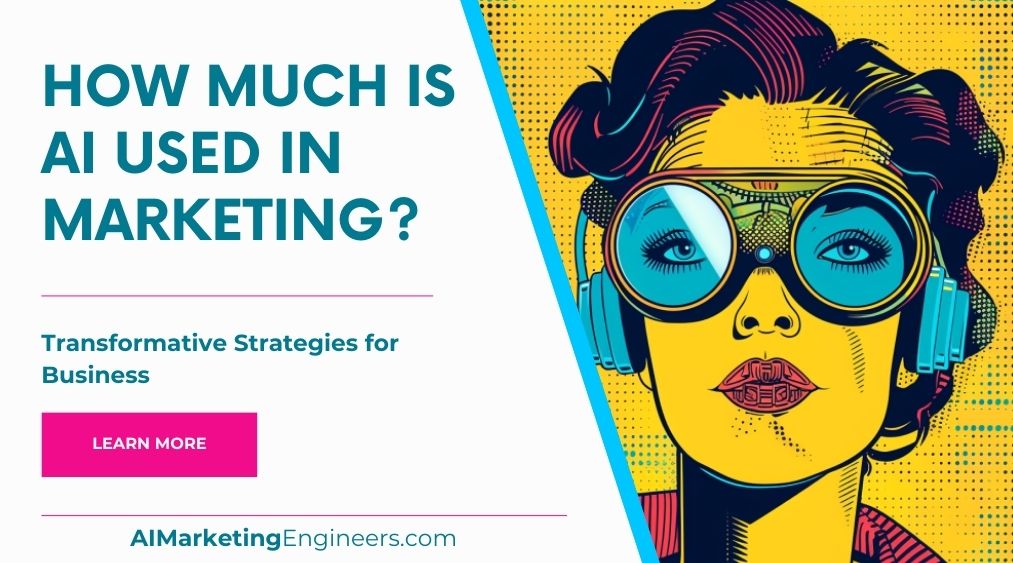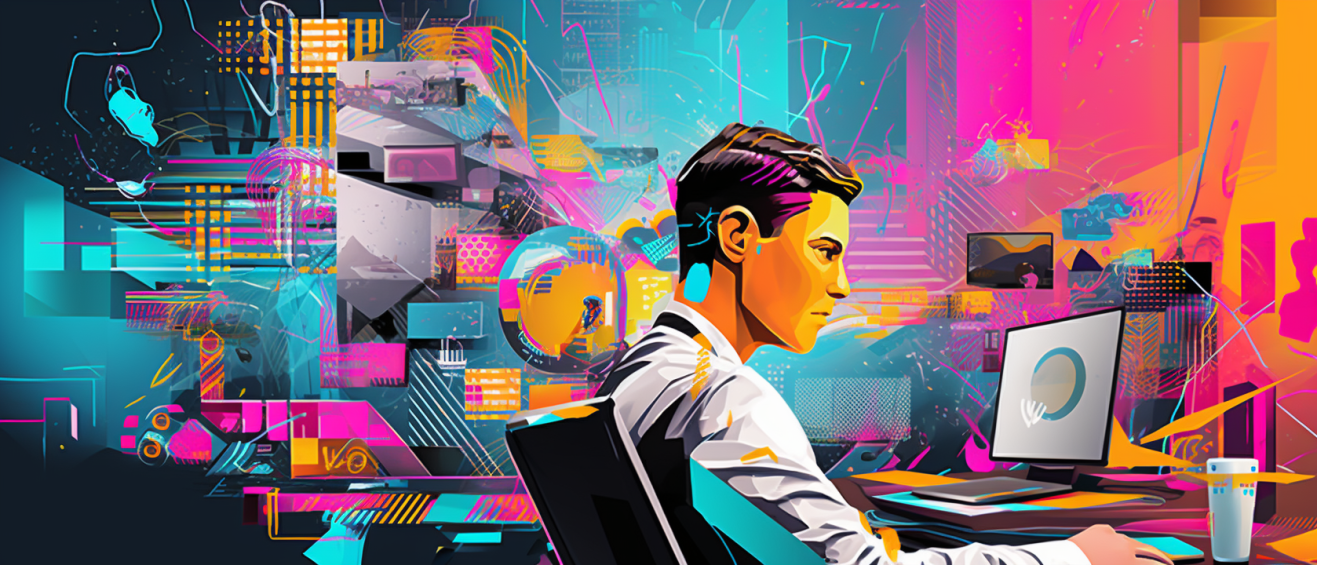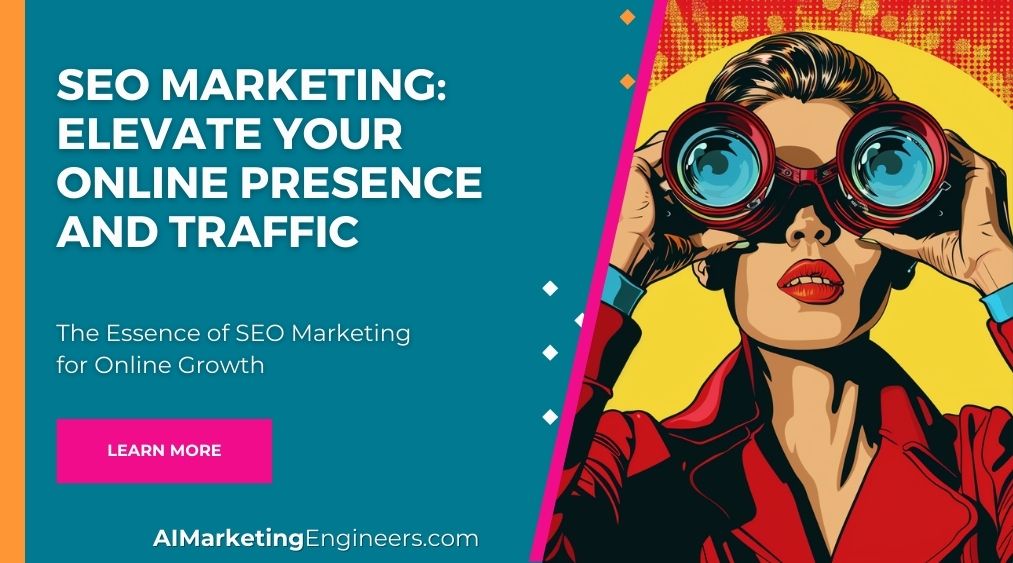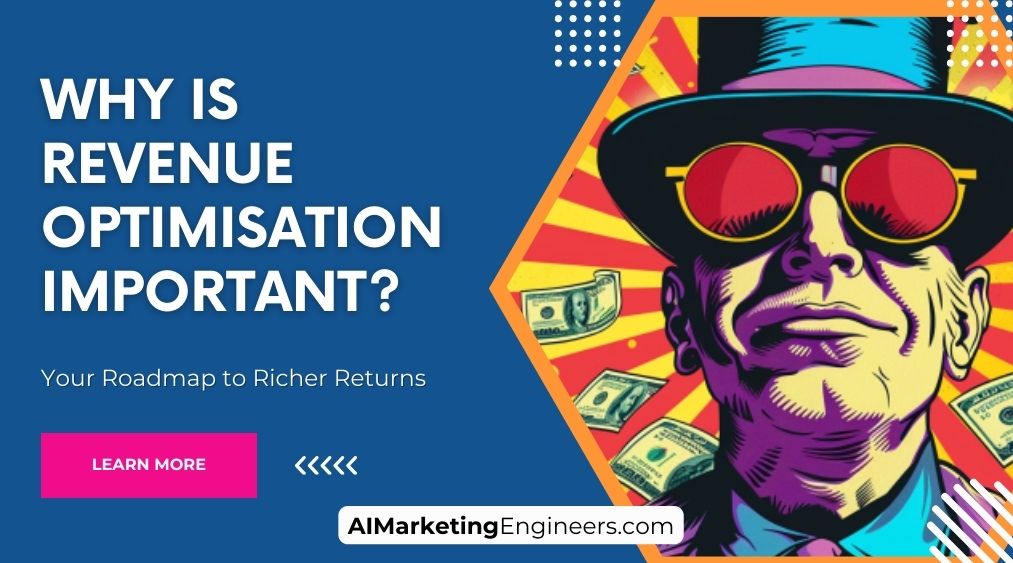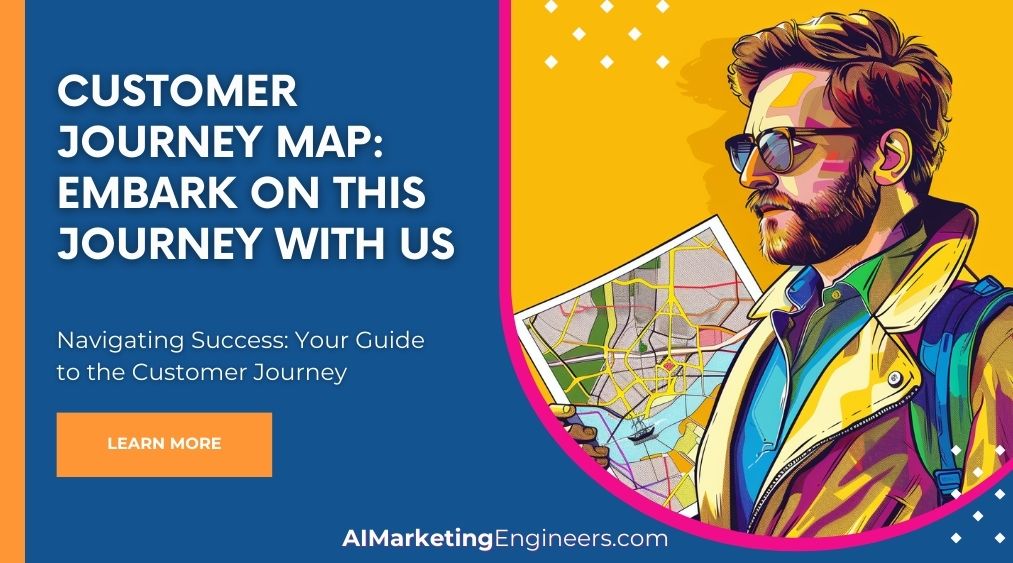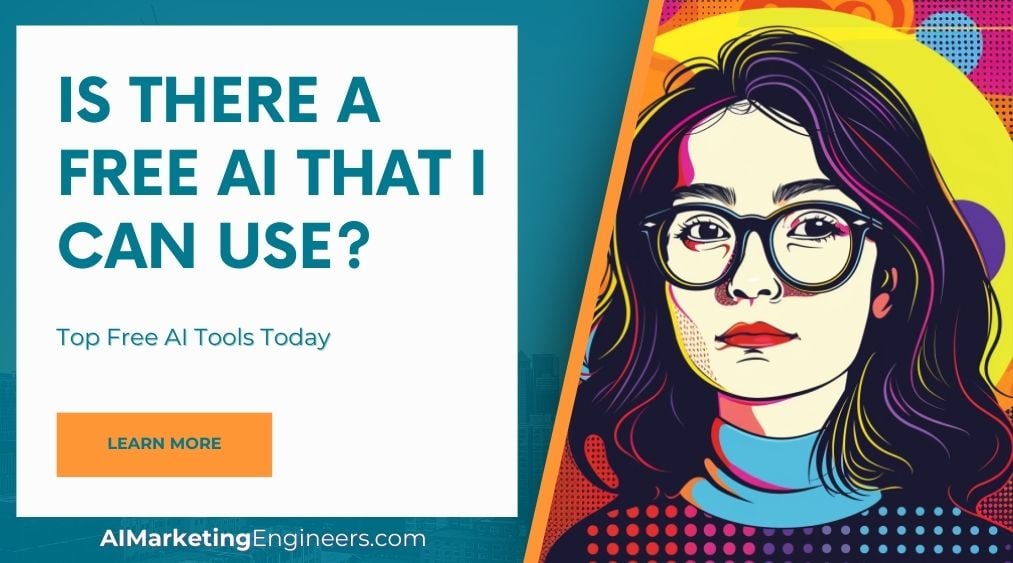Key Takeaways
✅ Artificial Intelligence (AI) is making waves in marketing, not just as a buzzword, but as a tool reshaping customer journeys with personalized experiences and smarter data insights.
✅ Speeding ahead, AI adoption is on a fast track, with 54% of marketing gurus weaving it into their plans. Stand by as we discuss its impact on efficiency, campaigns, and ROI.
✅ With great power comes great responsibility; navigating AI's perks and pitfalls is a delicate dance concerning data privacy, ethics, and the workforce. Let's explore this balance.
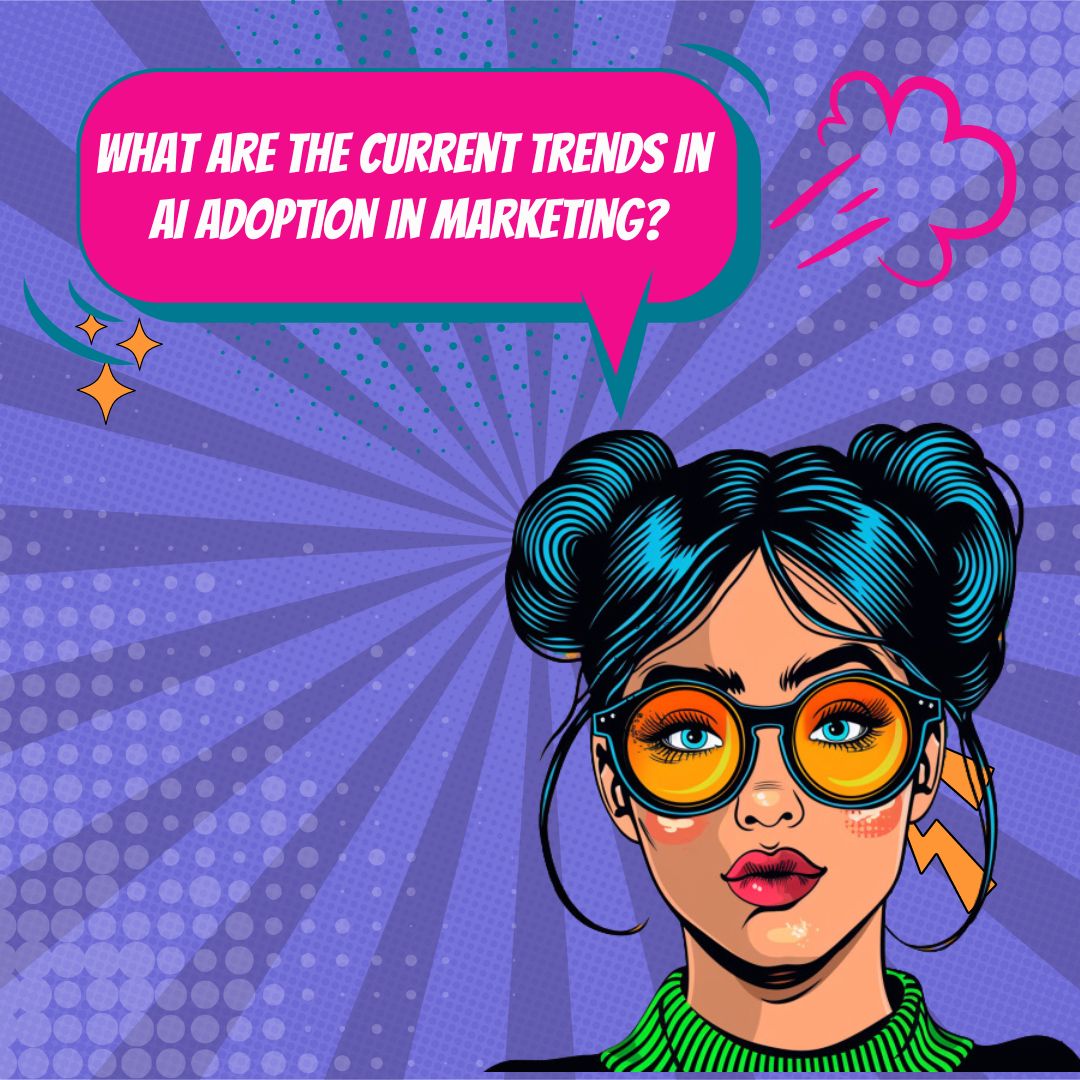
Introduction
How much is AI used in marketing? Ever stop to think about how those online ads seem to read your mind? That's AI at work, my friends – it's changing the game in marketing and we need to talk about it. AI in marketing isn't just about those shiny robots or complex algorithms you hear about in sci-fi movies; it's a powerful partner that's here to stay.
Imagine receiving offers that feel like they were made just for you or talking to a customer service bot that actually gets it. Sounds like a dream, right? Well, that reality is here thanks to AI. In this piece, we'll dive into personalizing customer experiences, forecasting the next big sale with predictive analytics, and creating content that clicks with your audience.
But wait, there's more – we'll peek into the crystal ball of marketing's future and guide you through the twists and turns of AI's fast-approaching trends. Stick around if you're itching to uncover actionable insights and groundbreaking tips to propel your marketing into tomorrow.
Top Statistics
| Statistic | Insight |
|---|---|
| Global spending on AI in Marketing: Expected to reach $327 billion by 2025, growing at a CAGR of 46% from 2020 to 2025. (Source: International Data Corporation) | This explosive growth showcases AI's pivotal role in revolutionizing marketing methods and strategies. |
| Marketing Operations using AI: As of 2021, 84% of organizations are implementing AI. (Source: Forrester) | AI is no longer a futuristic concept but a current reality, becoming a standard part of the marketing toolkit. |
| AI-driven Personalization: Can increase customer engagement rates by up to 80%. (Source: Evergage) | Customizing the shopper's journey isn't just nicety; it's a powerful enhancer of customer interaction and loyalty. |
| Customer Interactions via AI: Predicted that by 2025, 95% will be AI-driven. (Source: Servion Global Solutions) | Imagine nearly every chat, question, or purchase guidance being steered by smart tech. We're almost there. |
| Millennials and Gen Z Engagement: 63% are more likely to share data for personalized experiences. (Source: Accenture) | For the new generations, trust in a brand means expecting them to know what they want before they do. |
Enhancing Customer Experiences Through AI Personalization
Have you noticed how some online stores seem to know your taste better than your closest pals? That's AI-powered personalization in action. It's more than a savvy sales tactic; it's a way to create a shopping experience that feels individualized. Imagine scrolling through a site and finding everything tailored to your style and interests. AI achieves this by analyzing heaps of data about your online behavior—what you browse, purchase, or even ignore. And don't you love it when chatbots are not just helpful, but also make your interaction fun? They're the storefront's friendly faces, and they're getting smarter about handling your requests or inquiries, making you feel understood.
Predictive Analytics: The Magic Behind Effective Campaigns
When it comes to marketing, uncertainty is a no-go. That's why predictive analytics, powered by AI, is like a secret weapon. It decodes patterns in data to forecast what customers might want next. As a result, businesses can tailor their campaigns to hit the target spot-on. Have you ever thought about how an ad feels like it's speaking just to you? AI uses your past behaviors and preferences to serve ads that are most likely to grab your attention and make you click. It's like having a personal shopper for your interests, consistently bringing you things that catch your eye.
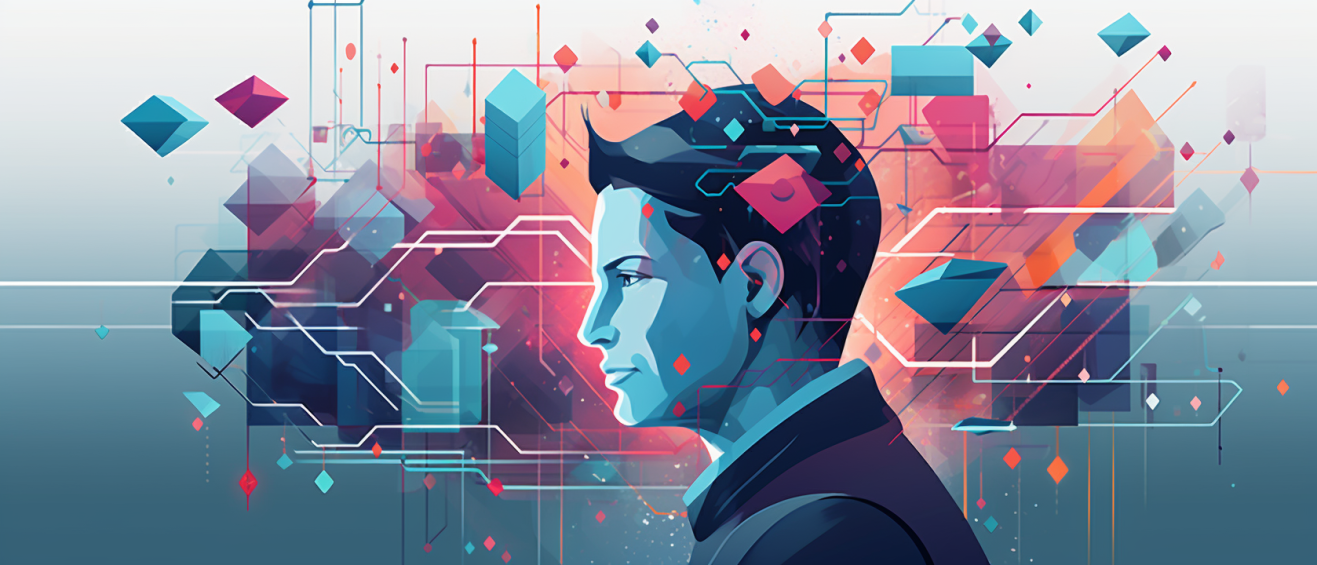
AI's Role in Crafting Relatable Content
In the world of content, standing out is key, and nothing beats the feeling of stumbling upon something that feels like it was crafted for you alone. AI steps in as an author and editor, fine-tuning content to resonate with your unique tastes. Ever read a phrase that stopped you in your tracks because it was so on point? That's AI, using natural language processing to understand the ebb and flow of human conversation and create content that hits home. By gauging what's important to the audience, AI ensures that what you read or watch is almost always relevant and engaging.
Streamlining Marketing with AI Automation
Nobody loves the grunt work, but it's got to be done—or does it? AI laughs in the face of repetitive tasks. Marketing automation is AI's playground, where it sends out emails and keeps the social media wheel spinning without human groans of boredom. This behind-the-scenes magic means that businesses can dedicate more energy to crafting strategies and ideas, while AI manages the gears of the machine. Have you ever noticed how brand messages are delivered with almost uncanny timing? That's AI ensuring that every interaction with you is timely and, hopefully, welcome.
Navigating Future AI Trends and Ethical Considerations
Just when we think we've got a handle on things, AI tosses something new into the mix. The rise of voice searches and the potential for virtual reality storefronts signals an even closer relationship between AI and our daily lives. But with such advancements, a shadow of concern looms—how will this affect our privacy and life choices? It's a conversation we need to have. Embracing new technologies means being aware of the potential risks and being part of the dialogue about how to use AI responsibly. Have you ever pondered what boundaries should exist between AI's convenience and our private lives?

AI in Marketing: A Revolution in Engagement and Efficiency
AI in marketing isn't just fancy tech—it's the new norm for communicating and connecting with customers. From the moment you land on a website to the customized emails that follow, everything is orchestrated by an AI that's constantly learning from your interactions. Brands are harnessing AI not only to cater to your preferences but also to do so with incredible efficiency. With AI on their team, businesses are ready to innovate and adapt to ever-evolving customer expectations. Are you excited about what this means for your future shopping experiences?
AI Marketing Engineers Recommendation
Recommendation 1: Invest in AI-driven customer insights for personalization: Because businesses that embrace AI for personalized marketing often see significant improvements in conversion rates and customer satisfaction. In fact, according to a report by Statista, around 90% of U.S. businesses that employ AI for personalization report measurable improvements in conversion rates. Use AI to analyze customer data and predict buying habits. This enables you to tailor your marketing messages for each individual, often in real-time, which makes your content more relevant and engaging. By providing a personalized experience, you're not just selling a product or service; you're creating a relationship. Have you ever opened a message or email that felt like it was crafted just for you? That's what we're aiming for here.
Recommendation 2: Leverage AI for predictive analytics in marketing strategies: AI's ability to predict future consumer behavior based on past data is priceless. The use of predictive analytics is set to rise dramatically, as 53% of enterprises aim to deploy it for better decision-making, per Forbes. Employ AI tools that help forecast trends and customer actions so that you can adjust your strategies accordingly. It's a bit like having a crystal ball, but one that's grounded in data rather than mysticism. Predicting what your customers want or will do can seem like magic, but it's really just smart business. By anticipating market trends, you can stay one step ahead, always ready to meet your customers' needs.
Recommendation 3: Embrace AI for content creation and optimization: AI is not just about crunching numbers; it's also emerging as a creative partner. Gartner predicts that by 2025, AI will be responsible for 20% of all content created. Use AI-powered content creation tools to generate and optimize blog posts, social media updates, and even videos. These tools can help you to produce content that resonates with your audience, often with minimal human input required. AI helps you produce content at scale, which might sound impersonal, but the opposite is true. It can ensure that your message is tailored and optimized for your audience, potentially making every interaction feel unique and personal. Who doesn't want to feel special?

Conclusion
So, we've journeyed together through the bustling world where artificial intelligence meets marketing, but let's pause and ask ourselves, what have we really learned? AI isn't just another tool in the marketer's toolkit—it's become the smart assistant that's always one step ahead. Think about it for a moment, how personalization has changed the game. Remember when we talked about chatbots and virtual assistants? They’re not fancy gadgets anymore; they’re your frontline workers, tirelessly improving customer experiences while you focus on the big picture.
And let’s not forget the power of predictive analytics—those smart insights that tell us what our customers might want even before they know it themselves. Have you noticed how that's reshaping the way campaigns are crafted and refined? Then there's content; oh, the content! AI is not just analyzing but helping to create content that resonates more deeply with our audience. That's storytelling with a pinch of science fiction, isn't it?
But it's not all sunshine and roses. With every leap forward, challenges loom. How do we keep the human touch in an increasingly automated world? What about privacy concerns and that nagging fear of the machines taking over? It's natural to wonder about these things. As we stand on the brink of more innovations like voice search and augmented reality, the question isn't if AI will be used in marketing—it's how much more integral it will become to our strategies.
Remember, keeping pace with AI isn't just about being on trend; it's about being ahead of the curve. It's about harnessing these smart solutions to forge connections, to tell stories that matter, and to create experiences that stick. So, what’s the next step? It’s about gearing up, staying curious, and always, always learning. Because in the dance of AI with marketing, those who stay nimble lead the way. How ready are you to take that next step?

FAQs
Question 1: What is AI in marketing?
Answer: Have you ever wondered how businesses seem to know exactly what you want? That's AI in marketing at work. It's like having a super smart assistant who can guess your next move, and it's all about making things like ads and emails feel like they're made just for you.
Question 2: Why is AI important in marketing?
Answer: Imagine trying to juggle a million balls at once. Pretty tough, right? Well, AI is like an extra pair of hands for marketers. It sorts through heaps of data super fast, so they can figure out what people like you love, and show you more of it. Nifty, huh?
Question 3: What are some common applications of AI in marketing?
Answer: AI is the wizard behind the curtain of things like chatbots that answer your questions any time of day, or when prices on your favorite shopping sites change before big sales. It's also the reason why you see those adverts that are so spot on, it's almost spooky.
Question 4: Can AI replace human marketers?
Answer: No way! AI is smart, but it can't dream up those crazy, cool ideas we all love. That spark of creativity? It's totally human. Think of AI as the trusty sidekick helping out, not the hero of the story.
Question 5: How does AI help with personalization in marketing?
Answer: You know that feeling when something seems made just for you? AI helps marketers do that by sorting through what you like, and what you don't, to sneakily customize everything so it feels like a perfect fit.
Question 6: Does AI require large volumes of data to be effective?
Answer: Yep, AI gobbles up data like it's at an all-you-can-eat buffet. The more it eats, the smarter it gets. But don't worry, it can still make some pretty snazzy moves even with less on its plate thanks to some brainy tricks it has up its sleeve.
Question 7: What are some challenges associated with implementing AI in marketing?
Answer: Getting AI up and running is a bit like training for a marathon—it can be tough. There are hurdles like making sure the data is tip-top, having the know-how to get things rolling, and sticking to rules about keeping everyone's info safe and sound.
Question 8: How does AI impact customer experience in marketing?
Answer: Ever had a chat with a robot online and thought, "Hey, this is pretty helpful"? That's AI making your life easier. It's all about giving you the VIP treatment, making things personal, and keeping you coming back for more.
Question 9: Can small businesses benefit from AI in marketing?
Answer: Absolutely! AI isn't just for the big fish in the sea. Little guys can play the game too, with some handy-dandy tools that don't cost a fortune and can make a big splash without needing a PhD in computer-whatsit.
Question 10: Are there any ethical considerations when using AI in marketing?
Answer: Oh, you bet. It's like having a superpower—you've got to use it for good. Keeping things fair, respecting people's privacy, and being clear about what's going on behind the curtain are the name of the game.
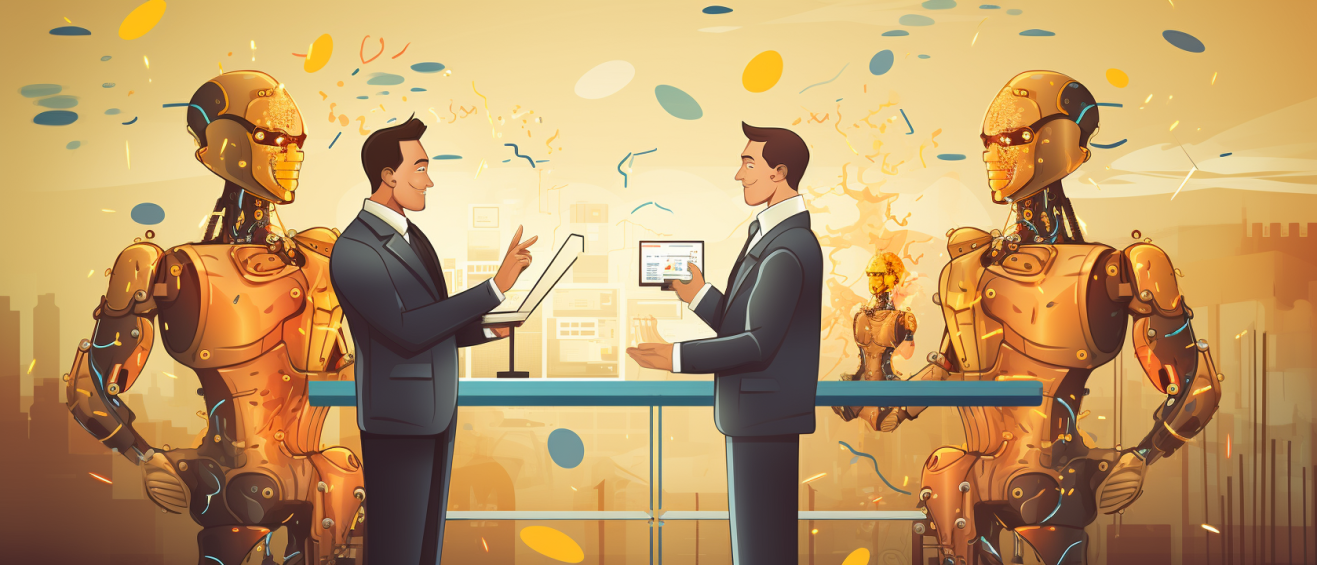
Academic References
- Penn, C. S. (2019). Artificial Intelligence for Marketers. Penn dives deep into the transformative power of AI in the marketing field, touching on vital concepts like machine learning, data crunching, customer sorting, trend prediction, and making things personal for each customer. Imagine a world where marketing is so targeted, it feels like it's talking just to you. Penn's exploration makes that idea less science fiction and more Monday morning at the office.
- Lee, J., et al. (2020). The Impact of Artificial Intelligence on Marketing Strategy. Journal of Business Research. Imagine a marketer able to predict your every want and need. This research isn't a crystal ball, but it's close, investigating how AI is shaping the way products and services are sold to you, focusing on improved customer journeys, smarter decision-making, and squeezing every ounce of value from resources, while not shying away from the tough stuff like privacy and moral rights and wrongs.
- Venkatesan, R., & Lecinski, J. (2018). AI for Marketing and Product Innovation. This text throws you into the frontline of customer engagement, where AI helps keep folks coming back for more. Think of talkative chatbots and computers that can pick up what you're putting down – emotionally speaking. The heart of the book beats to the rhythm of human-meets-AI partnerships paving the way for the next wave of marketing hits.
- Choi, Y. (2018). Personalization at Scale with Machine Learning in Advertising. Perplexity. Have you ever felt like an ad was crafted just for you? Choi discusses how AI isn't just a buzzword but a reality in pumping out content that feels tailor-made, thanks to deep learning that understands you might prefer sneakers over sandals, sci-fi over romance. This is about making ads that could win over even the biggest skeptics, by getting it right so often it's like they're reading your diary (but, let's not go there on the privacy issues, right?).
